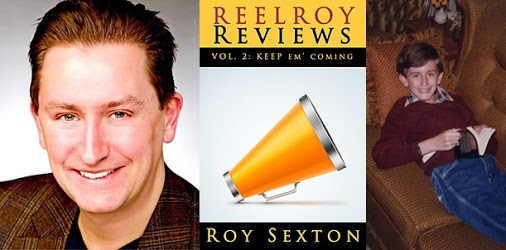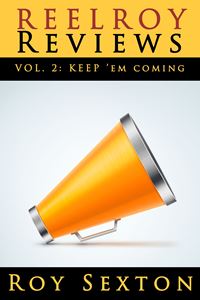![[Image Source: WIkipedia]](https://reelroyreviews.com/wp-content/uploads/2016/08/petes-dragon-poster.jpg?w=203&h=300)
[Image Source: Wikipedia]
Two such movies are rolling through your local cineplexes now, quietly charming audiences in the shadow of more cynical, merchandisable fare like Suicide Squad. I happened to catch Florence Foster Jenkins and Pete’s Dragon in a double feature on a warm summer weekday afternoon, no flu required, and I’m glad I did.
Perhaps surprisingly, Pete’s Dragon is the much stronger film. The original 1977 Disney film combined one-dimensional animation, even more one-dimensional performances (who thought Helen Reddy was a good idea?), and treacly songs (“Candle on the Water,” anyone? nah, I didn’t think so) into a forgettable diversion consistent with the Mouse House’s lousy Me Decade offerings (Apple Dumpling Gang … blech).
The new Pete’s Dragon director David Lowery wisely jettisons everything from the original flick, save the boy and his dog … er … dragon conceit, giving us a smart and deeply affecting parable on ecology, tolerance, and the healing power of companionship. Pete (played with a feral wariness by Oakes Fegley) is orphaned in an unidentified Pacific Northwest woods when his parents run the family station wagon off the road to avoid hitting a deer (Bambi’s revenge?). Pete is discovered by large, green, furry, canine-like dragon whom Pete quickly names Elliot, after a puppy in a beloved book Elliot Gets Lost. (I said the movie was good; I didn’t say it was subtle.)
Years pass, and Pete and Elliot carve out a pastoral existence, spending their days at play in the woods, sheltered at night in a cave filled with the discarded refuse of humanity (think The Black Stallion meets The Goonies). However, this wouldn’t be a summer movie without some narrative tension, and it wouldn’t be a Disney movie without some wholesome, well-intentioned, plucky, small-town intervention narrative tension. Along comes Bryce Dallas Howard as Grace, a forest ranger, instantly more believable than the thousand false notes she played as an opportunistic theme park executive in Jurassic World, fighting a losing battle against the foresting company owned by her own fiance Jack (American Horror Story‘s Wes Bentley – about as creepily cardboard as he always is). Pete’s curiosity about these Disneyfied people gets the better of him, he reveals himself, and, in a series of predictable plot points, Pete and Elliot are separated by (in order) hospital rooms, child protective services, and Jack’s skeezy, gun-loving brother Gavin (Star Trek‘s sparkling Karl Urban, who knows how to play a ridiculous cad without chewing too much scenery).
Lowery borrows liberally from the Spielberg school of mid-80s family film-making, and Spielberg himself was beholden to an encyclopedic obsession with films of his youth. One might argue that every Spielberg children’s movie seems to be trying to right any emotional damage that Old Yeller may have caused a young Steven. Lowery even wisely sets Pete’s Dragon in a pre-cell-phone late 70s/early 80s (never completely defined), when a child would see nature with wonder and not as a backdrop by which to catch the latest Pokemon Go creature.
Elliot, the dragon, is a marvel of movie design and animation, rarely exhibiting any of the jarring disconnects from reality CGI can sometimes cause – the work here is fluid and warm and fantastic and heartbreaking. Elliot never speaks and relays sensitivities the way a dog or cat might, through undulating body language and heavy sighs, sideways glances and guttural noises. Elliot is at once the film’s center and periphery, a guide and a protector yet also a victim of the cruel whims of serendipity and fate … which is pretty consistent with how humans treat any and all animals, in fact.
And that is likely Lowery’s point. Robert Redford is cast as Grace’s father Meacham, the town eccentric whose claims of meeting a dragon in the woods decades prior have fueled a host of urban legends and have alienated him from all but the town’s youngest denizens. Early in the film, Meacham foreshadows what is yet to come with the line, “If you go through life seeing just what’s in front of you, then you’re going to miss a lot.” Toward the film’s conclusion, when it’s pretty damn evident there is a dragon living in the woods, Grace asks her father to tell her what really happened all those years ago. Meacham looks at Grace (after relating how Elliot hates guns … thank you!) and says, “I looked at that dragon. And he looked at me. And we were at peace. Something changed in me that day, and I could never look at you or any other creature the same way again.” Yeah, I cried buckets.
![[Image Source: Wikipedia]](https://reelroyreviews.com/wp-content/uploads/2016/08/florence-foster-jenkins.jpg?w=205&h=300)
[Image Source: Wikipedia]
The film, directed in workmanlike fashion by Stephen Frears (The Queen, Philomena), is a wartime snapshot of the title character’s days and nights as a wealthy patron of the musical arts in New York City and as a woefully untalented vocalist with a shockingly tin ear. Alas, as portrayed by Meryl Streep (Ricki and the Flash, Into the Woods), Jenkins comes off (no pun intended) as rather one-note. Not unlike an episode of the aforementioned American Idol, it’s unclear whether the filmmakers are making fun of Jenkins or celebrating her unabashed moxie. Maybe I’m a bit simplistic, but trying to have it both ways with a character who cuts a more tragic than comic figure could be mistaken for cruelty.
In fact, Florence, (spoiler alert) on her deathbed, asks her dutiful (yet dubiously motivated) husband St. Clair (portrayed with surprising nuance by Four Weddings and a Funeral‘s Hugh Grant) if all this time everyone has been laughing at her. It’s intended to be a devastating self-realization. In fact, everyone has been laughing at her, including us. The film takes comic glee is showing how Jenkins’ simian-like vocalizations send audiences into apoplexy, so it’s a bit tough (akin to emotional whiplash) to suddenly invoke our sympathy after indulging our baser instincts.
That said, the film is a pleasant lark with more sweet than sour at its core. Like the BBC production it is, the film is a clutch of fussy mannerisms and pop-eyed reaction shots. Streep is as hammy as we’ve seen her in years, if her Julia Child from Julie and Julia had spent a long afternoon with her Miranda Priestly from Devil Wears Prada. Grant does a fine job complementing and contextualizing Streep’s performance (partly it’s the design of his role as Florence’s major domo and consigliere), and there is a lot of joy in watching him out of love, sweetness, and survival clear one hurdle after another, shielding Florence from the worst of her detractors and hangers on. In hiring a new accompanist for his tone-deaf wife, St. Clair delineates to Cosme McMoon (a pleasantly neurotic Simon Helberg, playing a soft-spoken variation on his Big Bang Theory‘s Howard Wolowitz) some of the more eccentric rules of the house: “The chairs are not for practical use. They honor those who died in them. Are you fond of sandwiches? And potato salad? We have mountains of the stuff.” Grant’s delivery, a perfect blend of pragmatism, wonder, and self-interest, should have been the tone the entire film took.
Regardless, if you are seeking solace from a summer move season filled with smart aleck mutants and half-baked sequels, frat boy comedies and nihilistic explosions, go check out the dragon (and Robert Redford) and stay for the potato salad (and Hugh Grant).
____________________
Bonus: If you missed this summer’s production of Xanadu, enjoy this video footage!
____________________

Reel Roy Reviews is now TWO books! You can purchase your copies by clicking here (print and digital). In addition to online ordering at Amazon or from the publisher Open Books, the first book is currently is being carried by Bookbound, Common Language Bookstore, and Crazy Wisdom Bookstore and Tea Room in Ann Arbor, Michigan and by Green Brain Comics in Dearborn, Michigan. My mom Susie Duncan Sexton’s Secrets of an Old Typewriter series is also available on Amazon and at Bookbound and Common Language.






![Description: Film poster; Source: Wikipedia [linked]; Portion used: Film poster only; Low resolution? Sufficient resolution for illustration, but considerably lower resolution than original. Other information: Intellectual property by film studio. Non-free media use rationales: Non-free media use rationale - Article/review; Purpose of use: Used for purposes of critical commentary and illustration in an educational article about the film. The poster is used as the primary means of visual identification of this article topic. Replaceable? Protected by copyright, therefore a free use alternative won't exist.](https://reelroyreviews.com/wp-content/uploads/2015/01/paddington.jpg?w=300&h=225)


![Description: Film poster; Source: Wikipedia [linked]; Portion used: Film poster only; Low resolution? Sufficient resolution for illustration, but considerably lower resolution than original. Other information: Intellectual property by film studio. Non-free media use rationales: Non-free media use rationale - Article/review; Purpose of use: Used for purposes of critical commentary and illustration in an educational article about the film. The poster is used as the primary means of visual identification of this article topic. Replaceable? Protected by copyright, therefore a free use alternative won't exist.](https://reelroyreviews.com/wp-content/uploads/2014/03/book-thief.jpg?w=200&h=300)
![Description: Film poster; Source: Wikipedia [linked]; Portion used: Film poster only; Low resolution? Sufficient resolution for illustration, but considerably lower resolution than original. Other information: Intellectual property by film studio. Non-free media use rationales: Non-free media use rationale - Article/review; Purpose of use: Used for purposes of critical commentary and illustration in an educational article about the film. The poster is used as the primary means of visual identification of this article topic. Replaceable? Protected by copyright, therefore a free use alternative won't exist.](https://reelroyreviews.com/wp-content/uploads/2014/03/mr-peabody-and-sherman.jpg?w=202&h=300)